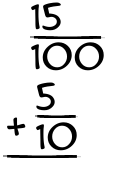What is 15/100 + 5/10?

|
Here's how we add
|
||||||||||||||||||
Step 1Our denominators (bottom numbers) don't match, so we can't add yet. Since 10 is evenly divided by 100, we can multiply just one term to get a common denominator. Multiply 5 by 10, and get 50, then we multiply 10 by 10 and get 100. The problem now has new fractions to add:
|
||||||||||||||||||
Step 2Since our denominators match, we can add the numerators. 15 + 50 = 65 This yields the answer
|
||||||||||||||||||
Step 3The last step is to reduce the fraction if we can. To find out, we try dividing it by 2... Nope. Try the next prime number, 3... Nope. Try the next prime number, 5... Are both the numerator and the denominator evenly divisible by 5? Yes! So we reduce it:
Now, try the same number again. Nope. Try the next prime number, 7... Nope. Try the next prime number, 11... Nope. Try the next prime number, 13... Nope. Try the next prime number, 17... No good. 17 is larger than 13. So we're done reducing. Congratulations! Here's your final answer to 15/100 + 5/10
|